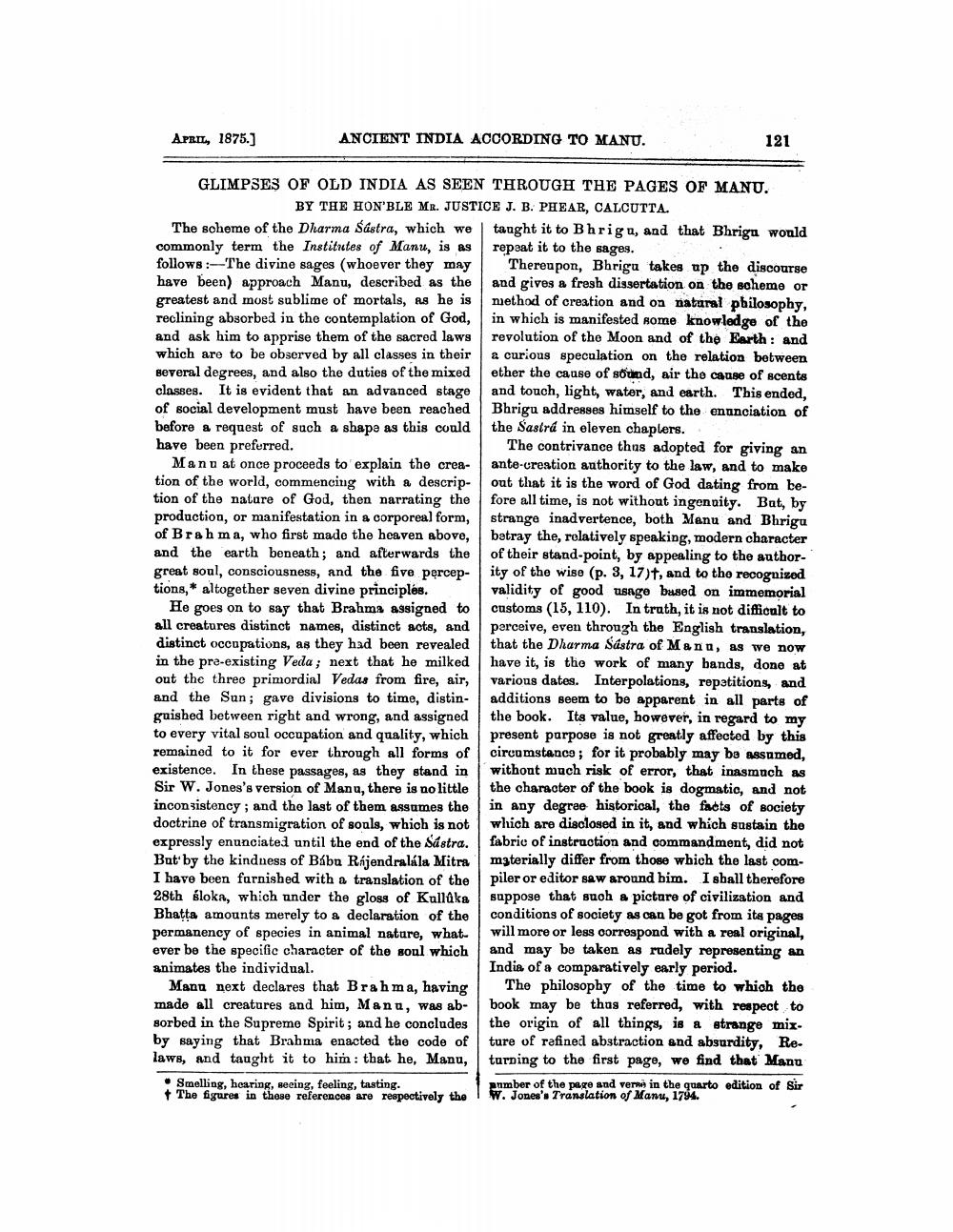________________
APRIL, 1875.]
ANCIENT INDIA ACCORDING TO MANU.
GLIMPSES OF OLD INDIA AS SEEN THROUGH THE PAGES OF MANU. BY THE HON'BLE MR. JUSTICE J. B. PHEAR, CALCUTTA.
taught it to Bhrigu, and that Bhrigu would repeat it to the sages.
The scheme of the Dharma Sastra, which we commonly term the Institutes of Manu, is as follows:-The divine sages (whoever they may have been) approach Manu, described as the greatest and most sublime of mortals, as he is reclining absorbed in the contemplation of God, and ask him to apprise them of the sacred laws which are to be observed by all classes in their several degrees, and also the duties of the mixed classes. It is evident that an advanced stage of social development must have been reached before a request of such a shape as this could have been preferred.
Thereupon, Bhrigu takes up the discourse and gives a fresh dissertation on the scheme or method of creation and on natural philosophy, in which is manifested some knowledge of the revolution of the Moon and of the Earth: and a curious speculation on the relation between ether the cause of sound, air the cause of scents and touch, light, water, and earth. This ended, Bhrigu addresses himself to the enunciation of the Sastra in eleven chapters.
Manu at once proceeds to explain the creation of the world, commencing with a description of the nature of God, then narrating the production, or manifestation in a corporeal form, of Brahma, who first made the heaven above, and the earth beneath; and afterwards the great soul, consciousness, and the five perceptions, altogether seven divine principles.
He goes on to say that Brahma assigned to all creatures distinct names, distinct acts, and distinct occupations, as they had been revealed in the pre-existing Veda; next that he milked out the three primordial Vedas from fire, air, and the Sun; gave divisions to time, distinguished between right and wrong, and assigned to every vital soul occupation and quality, which remained to it for ever through all forms of existence. In these passages, as they stand in Sir W. Jones's version of Manu, there is no little inconsistency; and the last of them assumes the doctrine of transmigration of souls, which is not expressly enunciated until the end of the Sastra. But by the kindness of Bábu Rajendralála Mitra I have been furnished with a translation of the 28th śloka, which under the gloss of Kulluka Bhatta amounts merely to a declaration of the permanency of species in animal nature, whatever be the specific character of the soul which animates the individual.
Manu next declares that Brahma, having made all creatures and him, Manu, was absorbed in the Supreme Spirit; and he concludes by saying that Brahma enacted the code of laws, and taught it to him: that he, Manu,
121
Smelling, hearing, seeing, feeling, tasting.
The figures in these references are respectively the
The contrivance thus adopted for giving an ante-creation authority to the law, and to make out that it is the word of God dating from before all time, is not without ingenuity. But, by strange inadvertence, both Manu and Bhrigu betray the, relatively speaking, modern character of their stand-point, by appealing to the authority of the wise (p. 3, 17)†, and to the recognized validity of good usage based on immemorial customs (15, 110). In truth, it is not difficult to perceive, even through the English translation, that the Dharma Sástra of Manu, as we now have it, is the work of many hands, done at various dates. Interpolations, repetitions, and additions seem to be apparent in all parts of the book. Its value, however, in regard to my present purpose is not greatly affected by this circumstancs; for it probably may be assumed, without much risk of error, that inasmuch as the character of the book is dogmatic, and not in any degree historical, the facts of society which are disclosed in it, and which sustain the fabric of instruction and commandment, did not materially differ from those which the last compiler or editor saw around him. I shall therefore suppose that such a picture of civilization and conditions of society as can be got from its pages will more or less correspond with a real original, and may be taken as rudely representing an India of a comparatively early period.
The philosophy of the time to which the book may be thus referred, with respect to the origin of all things, is a strange mixture of refined abstraction and absurdity, Returning to the first page, we find that Manu
number of the page and verma in the quarto edition of Sir W. Jones's Translation of Manu, 1794.




